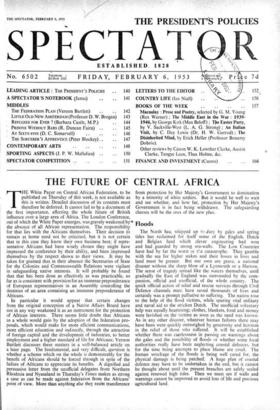THE FUTURE OF CENTRAL AFRICA In particular it would appear
that certain changes from the original conception of a Native Affairs Board have not in any way weakened it as an instrument for the protection of African interests. There seems little doubt that Africans as, a whole would gain by the adoption of the federation pro- posals, which would make for more efficient communications, more efficient education and indirectly, through the attraction of foreign capital and the development of industries, to better employment and a higher standard of life for Africans; Vernon Bartlett discusses these matters in a well-balanced article on a later page. The fundamental, and very difficult, question is whether a scheme which on the whole is demonstrably for the benefit of Africans should be forced through in spite of the failure of Africans to appreciate its benefits. A dignified and persuasive letter from the unofficial delegates from Northern Rhodesia and Nyasaland in Thursday's Times makes as strong a case as can be made against federation from the Africans' point of view. More than anything else they resist transference from protection by Her Majesty's Government to domination by a minority of white settlers. But it would be well to wait and see whether, and how far, protection by Her Majesty's Government is in fact being withdrawn. The safeguarding clauses will be the crux of the new plan.


































